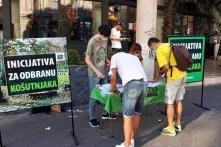Corrective or an Enemy? Serbian Civil Society Under Threat
Corrective or an Enemy? Serbian Civil Society Under Threat - Heinrich-Böll-Stiftung
 Watch on YouTube
Watch on YouTube
Which types of attacks are civil society activists facing? What are their strategies for dealing with the increasing pressure on human rights defenders and opposition activists in Serbia? Where do German politicians dealing with the region see their scope for action?
With - Sofija Todorović, Youth Initiative for Human Rights (YIHR), Serbia - Vladimir Arsenijević, author, co-founder KROKODIL, Belgrade - - Boris Mijatović, Member of parliament, Alliance 90 / The Greens; Moderation: - Milan Bogdanović, Program Coordinator, Heinrich Böll Stiftung Belgrad - Nataša Govedarica, Country Director Serbia, forumZFD
Political Culture and Dialogue
We are in the midst of a revolution in the way that knowledge and culture are created, accessed and transformed. Citizens, artists and consumers are no longer powerless and isolated in the face of industries producing and distributing content, and they are increasingly becoming independent from state control and state funding: Now individuals across many different spheres are collaborating, participating and making decisions in a direct and democratic way, which is leading to the development of new models of financing cultural activities and managing common goods. With this program we want to contribute to the dialogue between Serbia, Montenegro and Kosovo amongst each other, and between the Westbalkan region and Germany and the European Union.






